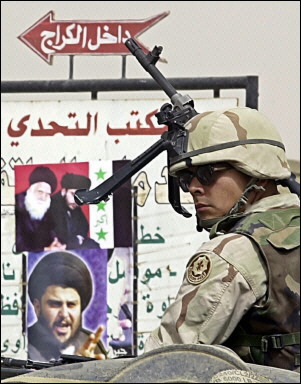May 12, 2004
Military opens investigation into alleged prisoner abuse in Afghanistan
By Stephen Graham
Associated Press
KABUL, Afghanistan — The U.S. military has opened an investigation into allegations that an Afghan police officer was stripped naked, beaten and photographed at a U.S. base in Afghanistan, the American embassy in Kabul said Wednesday.
The alleged abuse occurred in August 2003 at the American base in the eastern town of Gardez, 100 kilometers (60 miles) south of the capital, Kabul, an embassy statement said. U.S. officials learned of the allegations from the media, it said.
“The U.S. military has launched an immediate investigation,” the statement said.
Lt. Col. Tucker Mansager, a U.S. military spokesman, said the case was only brought to the military’s attention on Tuesday, and that it was being investigated by the army’s Criminal Investigation Department.
He would not discuss the details of the allegations, saying the military wanted the investigation to be conducted in a “totally impartial manner.”
The New York Times quoted the former police colonel, Sayed Nabi Siddiqui, 47, as saying he was subjected to sexual abuse, taunting and sleep deprivation.
“To the best of our knowledge, this is the first time anyone in the military chain of command or the United States Embassy has heard of this alleged mistreatment,” U.S. Ambassador Zalmay Khalilzad said in the statement.
“We are not aware of the existence of any photos of the alleged incident,” he added.
Ahmed Zia Langari, a member of the Afghan Human Rights Commission, which has been involved in Siddiqui’s case, said it informed the United Nations of 44 total complaints of ill-treatment, but that none of the other complainants had alleged torture or physical abuse.
Langari said the commission brought Siddiqui’s case to the attention of the United Nations last August and requested that the world body help set up a meeting with coalition forces. Such a meeting has not yet taken place, he said.
The commission has requested access to the U.S. jail at Bagram and at holding facilities elsewhere, but the military has so far refused, Langari said. Mansager said the request was “being mulled over.”
Photographs allegedly showing abuse of prisoners by U.S. soldiers in Iraq have angered many in Afghanistan, Langari said.
“Afghan citizens have seen the situation in Iraq on their televisions, so naturally they are concerned that this kind of treatment is going on here,” Langari told AP. “If this is proved, then it is the duty of the coalition forces to deal with the perpetrators.”
Khalilzad said he was confident the military’s investigation would be thorough and lead to “appropriate action” if the allegations are true.
On Tuesday, the top U.S. general in Afghanistan said the military had made “very significant changes” to the way it handles prisoners in Afghanistan after alleged abuse, including the deaths of three prisoners.
Lt. Gen. David Barno said the military had investigated “challenges and problems” at outlying bases and that it decided to transfer suspects to the main holding facility at Bagram, north of the capital, more quickly.
Barno made no mention of Gardez or the allegations made by the police officer.
The New York Times quoted Siddiqui as saying he was wrongly detained on July 15 after he reported police corruption and that someone then accused him of being a member of the Taliban. He said he was held for about 40 days at three different U.S. bases: at Gardez, Kandahar in southern Afghanistan, and Bagram.
He described being humiliated repeatedly during his detention in all three places.
Siddiqui told the Times that for the 12 days he was in Kandahar, detainees were packed into wire cages and forced to use a bucket as a toilet in front of other detainees.
He also said soldiers threw stones and bottles at detainees.
“It was like stoning monkeys at the zoo,” he told the New York Times. “They brought buckets of stones and they were laughing as they did it.”
The U.S. military opened a formal investigation into the deaths of two Afghans at Bagram’s closely guarded jail in December 2002, but says it has had trouble gathering evidence and has yet to release results.
Military autopsies found that both men died of blunt force injuries.
A third Afghan died last June at a holding facility in eastern Kunar province.
A U.S. intelligence official said last week that the CIA inspector general is investigating that death because it involved an independent contractor working for the agency.
Afghan government officials have expressed concern that any sign of widespread abuse could turn ordinary Afghans against the presence of foreign soldiers, but remain supportive of the presence of 20,000 U.S.-led troops here.
The U.S. military views Taliban and al-Qaida prisoners as “unlawful combatants,” and has held hundreds captured in the war that ousted the Taliban in late 2001 for more than two years without formal charge or access to lawyers.
Army Times - News - More News


















